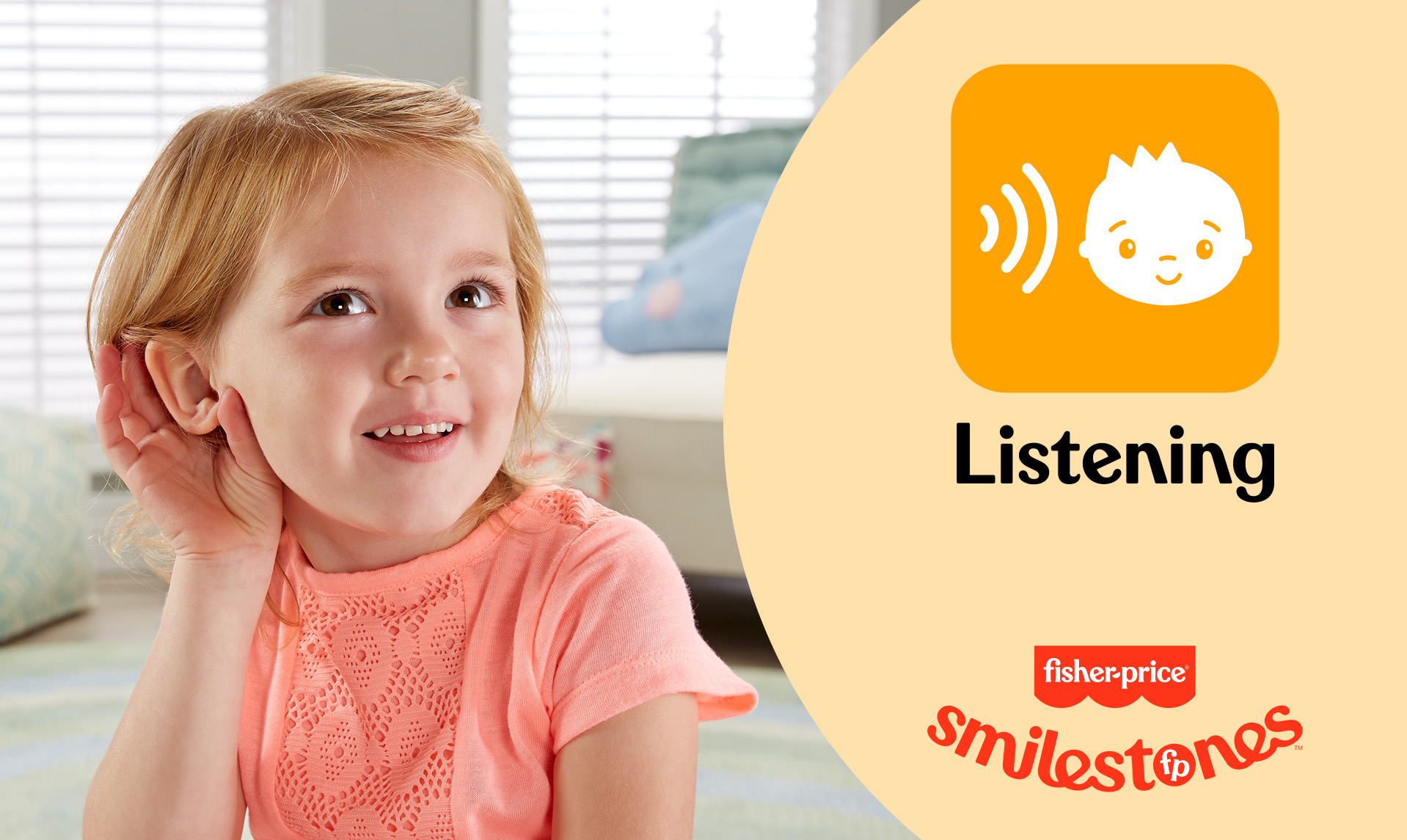Helping Your Toddler Develop Their Listening Skills
June 23, 2023
No time to read? No problem.
Here’s the long-story-short:
- Listening skills begin to develop and grow from the newborn stage.
- Reading, modeling active listener behavior and games with simple directions encourage listening skill development.
- Toddlers begin to demonstrate their listening skills by following directions or listening contentedly to stories or music.


Put on your listening ears.
How many times a day do you find yourself saying that – or some variation of it? I know I say it probably more times in a day than I thought possible or would like to admit. Even as an early-childhood development expert, I regularly need to remind myself that my kids’ listening skills are still growing and developing every day. It’s going to take patience and consistency to help them along the way – but the best way to help them hone their listening skills is through fun and play.


Depending on your child’s age, their skills will vary.
In the first six months of their lives, little ones show off their developing listening skills by showing active interest in a person or object for about a minute. Eventually, they’ll focus on a toy that’s just out of reach and try to reach for it or they’ll play for 2 to 3 minutes with a single toy. From 9 to 12 months, they’ll start to listen to speech without being distracted by other sources. They may even focus on one toy or activity for a while if they’re really interested.
Then comes toddlerhood…
At about 12 to 15 months, your little one may start to display distractable behavior. From 18 to 24 months, kids can start to enjoy solitary or activity play for a few minutes at a time. They will also sit in your lap to read a book with you.
Two years old is when your kiddo will typically be able to listen actively for about 3 to 6 minutes.
Right before 3 years old they’re actively listening for about 6 to 10 minutes, and they could be demonstrating this by incorporating questions during conversations.
Toddler Stage and Beyond
As your child grows, their skills grow and they begin to demonstrate how they listen with things like following directions or completing tasks. By around 30 to 36 months, your child might be completing tasks with a little guidance from you. They might sit quietly and listen to music or stories. You’ll begin to see how the skill of listening goes hand-in-hand with their attention span and comprehension.
Gentle reminder: If you ever have concerns about your child’s development, trust your gut and reach out to your pediatrician.

How can I encourage my toddler’s listening skills?

1. Read. Read. Read.
Reading is good for little ones for so many reasons – including helping with listening. As they grow, reading helps build their listening skills and attention span. To add a little fun to story time, ask your toddler to “help” finish the story using their own words. You may get a surprise twist to a familiar ending!

2. Model Behavior.
Show your child that you’re listening to them. Speak with them, listen to them and respond throughout the day demonstrating active listening. Sprinkle in some ‘please’ and ‘thank you’s to help reinforce manners and kindness while showing that you’re actively listening.

3. Follow the leader.
For toddlers (around 12-24 months), give them simple one-step directions. Once they reach 24-36 months, two-step directions will be a breeze.

4. Freeze Dance!
Dance is a fantastic way to work on listening skills. Playing dancing games or with toys that prompt with simple directions makes developing listening skills fun and lighthearted.


As with so many aspects of parenting, stay supportive and give your little one positive feedback. They thrive on knowing they’ve done a good job.



Parent check-in
How are you feeling?
It can be frustrating sometimes when you feel like you’re not being heard. For me, it’s when I am trying to get my littles out the door and they’ve suddenly remembered they just had to reconfigure the layout of their train tracks. That’s when I pause. I take a deep breath and remind myself of how old they are and offer a little more guidance to stay on task. Sometimes getting down onto their level and looking into their eyes when you’re talking, models positive active listening behavior.
I do want to say, it’s ok to want and need a break. Raising a good listener is no small feat and you’re doing great.
Gentle reminder: If you ever have concerns about your child’s development, trust your gut and reach out to your pediatrician.”

Bringing a smile to milestones.
Say hello to happier parenting. We’re here to help you celebrate the little victories, let go of expectations, and pick up more positivity. Because after more than 90 years of helping families, we’ve learned that development happens naturally when fun leads the way.
Learn More


































